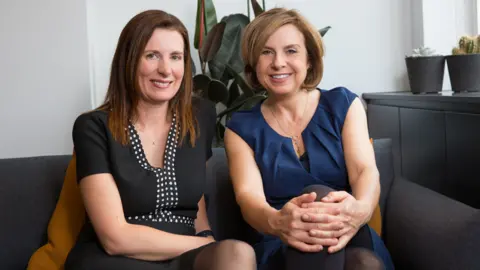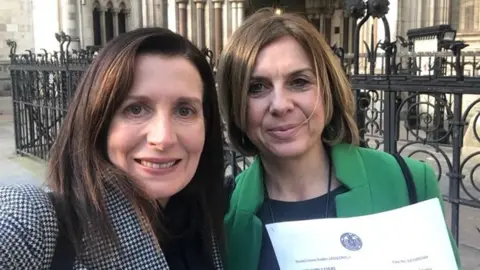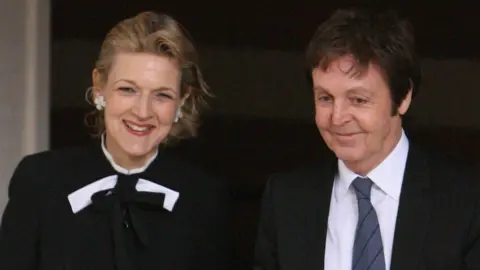The friends helping people divorce without lawyers
 Pip Wilson and Kate Daly
Pip Wilson and Kate DalyThe BBC's weekly The Boss series profiles different business leaders from around the world. This week we speak to Kate Daly and Pip Wilson, co-founders of lawyer-free divorce service Amicable.
When Kate Daly and her former husband split up, she says matters quickly became toxic and expensive when they both hired divorce lawyers.
"It escalated very quickly, not only into a conflict, but into huge amounts of money being spent, on things that were irrelevant, and not important to the process," she says. "Because I didn't understand what the process was."
Kate was so unhappy with what she had to go through, that she decided that she would change career to help other divorcing couples try to get through the process more amicably. So in 2012 she switched from being a corporate counsellor working with business leaders, to a divorce coach helping husbands and wives best separate without rancour.
 Getty Images
Getty ImagesThe idea is that the coach improves communication, both between the couple and both sets of lawyers, removing conflict.
Then brainstorming with her friend Pip Wilson, Kate realised that she could go one stage further - allow couples to divorce without lawyers being involved at all.
And so their company Amicable was born in 2015. Estranged couples can use use the app and website to liaise with an artificial intelligence "chatbot", or speak to human divorce coach by telephone.
The idea is that Amicable helps and guides couples on agreeing and drafting a divorce settlement that they (the couple) then take to a family law judge in England and Wales for the divorce to be granted.
So far Amicable has helped more than 2,000 couples divorce. It claims to be both much cheaper and faster than going down the traditional lawyer route. It says that couples can pay as little as £300, and that a simple divorce without a financial arrangement can be agreed in just four months.
 Getty Images
Getty Images"Divorce ultimately is a sad thing, but it's not a bad thing," says Pip. "People shouldn't be punished for coming to what no doubt is a really, really difficult decision."
Given the scope that Amicable has to disrupt the divorce market, it is unsurprising that family law lawyers have questioned its legality. So too have some family court judges.
This uncertainty was put to bed in January when a High Court judge ruled in Amicable's favour. Mr Justice Mostyn said: "There can be no doubt that the initiative of Amicable has greatly improved access to justice, for many people effectively disenfranchised from the legal process, by the near total withdrawal of legal aid from private family law proceedings."
He added that he was "fully satisfied that no conflict of interest arises" from the fact that Amicable works with both parties to the divorce.
Kate said, following the judgement, that it would "change the legal landscape forever".
London-based Amicable has now secured about £1m of investment to fund its expansion. Its current annual turnover is about £600,000 and it has 15 employees.
"We've proved the solution, and we've proved the demand," says Pip. "We've got enough customers through the system now to know that this works."
 Pip Wilson
Pip WilsonAs the company has grown over the past five years, Kate says they have encountered some stigma from potential investors because of what the company does. "There are some people who said 'no' from the outset because they don't want to be involved in a business that deals with divorce," she says.
But Kate insists that "we're not about making it easier for people to divorce". Rather, she says: "We're about people getting through the process in a way that doesn't add to what is already a difficult situation."
Richard Moorhead, professor of law at the University of Exeter, says that Amicable is "really interesting". "What I really like about what they're doing, is they really think about the soft side of what the clients want in terms of service, and what might work for them," he says.
However, Prof Moorhead adds that Amicable might not be suitable for many divorcing couples "because obviously there's some mistrust between the parties quite often".
 Getty Images
Getty ImagesFrances Petterson, a divorce lawyer at London-based family law firm Newton Kearns, says that specialist divorce solicitors will always be required in complex cases.
"People's lives and finances are complex, and it is not always a case of adding everything together and dividing by two," she says. "There can be issues of ownership, inheritance, pre- or post-marital assets, valuation, liquidity, international dimensions, tax consequences and the distribution of particular assets - the list is endless.
"Family law solicitors can advise and assist with these complexities. Having said that, I absolutely think there is market for Amicable - particularly in circumstances where a couple's assets are straightforward."

More The Boss features:

Kate and Pip first became friends 13 years ago when both pregnant, they met at a National Childbirth Trust class for mums-to-be in west London. While Kate was a corporate counsellor, Pip was a tech entrepreneur.
Now both their mid-40s, they say they try to recruit fellow parents. This is so that their staff are around the same age as their customers, who are on average between 35 and 50.
As they continue to expand the business, Kate says: "We can't afford to be stuck in an old divorce system where it's Paul McCartney and Heather Mills throwing things at each other in a courtroom. People can't afford the expense, and they can't afford the emotional aggravation."
